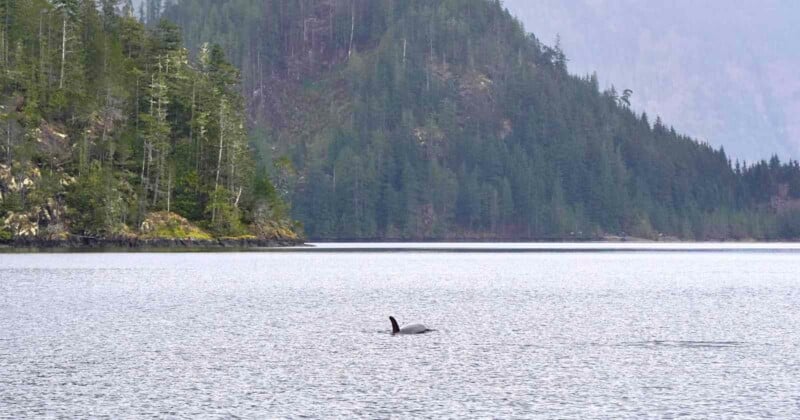Photographers Asked to Help Reunite Stranded Baby Orca With its Pod

Rescuers have asked for local photographers to help in the efforts to reunite an orphaned baby orca with its pod.
A two-year-old orca has spent weeks circling a lagoon off the west coast of Canada where its mother died.
On March 23, the baby whale’s pregnant mother became stranded at low tide and died. Since then, rescuers have been left scrambling to save the calf which is stranded off Vancouver Island from the same heartbreaking fate.
However, whale experts have so far been unable to coax the orphaned baby orca out of the lagoon. Furthermore, the route the calf would need to pass through to free itself is a difficult and hazardous stretch of water.
According to The Telegraph, rescuers now plan to airlift the calf — named kʷiisaḥiʔis (pronounced kwee-sahay-is) — into the Pacific Ocean as part of a rescue attempt to reunite it with its family.
Rescuers hope to use a sling to lift the calf, which is trapped in a remote tidal lagoon off the coast of Canada, out of the water with a helicopter.
From there, it will be carried to a holding net pen in the Pacific Ocean until its family pod is located and swims near enough for the orca to be released.
Canadian news outlet CBC reports that rescuers are hoping to use the latest AI technology to reunite the orphaned orca calf with its pod — and local photographers may be able to help with these rescue efforts.
Can You Help Reunite a Baby Orca With Its Family Pod?
In a Facebook post, The British Columbia-based whale research group Bay Cetology is offering access to its online AI-assisted photo database “Finwave” to local photographers and tour operators as part of efforts to track the whale’s relatives, in the hopes that images could help connect the calf with its pod.
Executive director of Bay Cetology Jared Towers tells CBC that Finwave scans submitted photos of killer whales and can quickly identify individual orcas based on their dorsal fins and other markings. Photographers who have any photos of killer whales in the area should submit their photos to Finwave.
Towers says that scientists have been able to identify specific animals using their fins for more than 50 years.
“Really, this is just an extension of that research methodology,” Towers tells CBC.
“It started with film, and then it went digital, and now we’re transitioning into deep learning, machine learning, or an artificial intelligence kind of model to conduct this work moving forward.”
The rescue of the baby whale is expected to occur within the next two weeks. Local photographers can request free access to Finwave by contacting [email protected] by email.
Image credits: Header photo via Facebook/Bay Cetology.